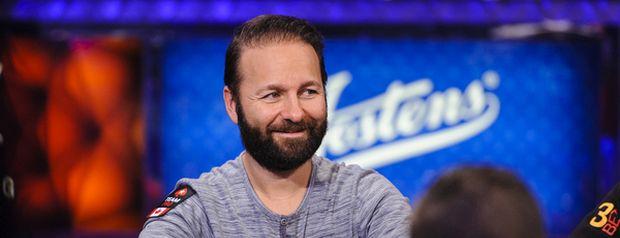3 Aug
(Photo: Poker.co.uk)
Ask most professional poker players what they love about poker and the answers will include making money, building a chip stack, and the thrill of winning. Many will also say the mental challenge of making the correct decisions as often as you can when faced with a tough decision. In order to make this decision correctly, you have to keep a hold of your emotions. If you crack under pressure then your chances of becoming a great poker player are vastly reduced and probably impossible.
I admit I do not always find it easy to follow the tips I will give you today, but I am aware of them and always work on these areas in an ongoing effort to improve. The question we will discuss today is, ‘How do you keep cool in a tight spot?’
Do Not React to Table Talk
There is a reason Daniel Negreanu tries to make friends with and talk to players at the table. Sure, he is a friendly guy who might otherwise be bored, but there is more to it than that. He knows he can extract vital information from you regardless of whether you answer a question or not. Even the way you decline to answer can give information away that players like Daniel can use to help him decide what to do.
Most of our communication is nonverbal and beyond our conscious control, so you need to make a decision on how you react if you put an opponent all-in and they begin to quiz you. It is dangerous to begin to make quips, tell jokes, squirm, and try to be deceptive. I find that try as I might to give the wrong impression, I seem to always end up being more transparent than ever. There is nothing worse than hoping for a call, making some sort of action and an opponent saying “Wow, you definitely have it” and folding. You feel like a mug.
I would recommend being stoic and not getting into a discussion. Let your opponents stew on their tough spot. If they start saying “I won’t act until you answer”, remain patient. Eventually the clock will be called and the action will continue. You are better off trying to say and do nothing than saying something silly and giving the game away.

Practise Emotional Balance
Sitting still in a high pressure spot with the anticipation and tension building before your opponent acts is an experience unique to poker. You must get to grips with the stress of these situations or you risk coming out of a long tank and thinking “I never want to do that again”, quickly folding, or avoiding an all-in to stay away from a similar spot in the future.
If you can, disassociate from the spot and just wait and see. Let your mind wander. I often daydream about my favourite computer game and try to completely forget about what is going on. If you have earplugs or earphones, switch on music and watch for opponents to either throw chips into the middle or muck their hand. Emotional balance is key and will mean you do not suffer a deterioration in your mental state with multiple all-ins and stressful periods of time where it feels all eyes are on you.
Practice this at home. When I played Pool I used to practice clearing the table imagining it was the deciding rack in a big match. I got quite good at it. It’s amazing how familiar the feeling was when I did get into a tight match where I was able to keep cool because I was familiar with the stress of the situation. Familiarity breeds confidence.

Get Outside Help
Poker forum user “Dutch Courage” in 2011 posted this very honest post. The sentiment holds true today.
I have been dealing with same problem myself since day 1, and I have played medium stakes for 3 years, I actually sold my main event ticket to the Melbourne champs because my nervousness (shaky hands, rapid heart rate) was ruining my game, now the next problem I was faced with was I found drinking alcohol eased my stress, but next thing I knew I was drinking every time I played poker, so soon I was drinking 3-4 nights a week and ended up with a slight drinking problem. I have been to see a psychologist for this issue as I consider poker as a part time job.”
Whilst you can practice emotional control, you may have a medical reason or be predisposed to stress and anxiety to the point where you need outside help to keep you in the best possible mental shape to face and conquer the tough situations you will encounter when playing poker. There is no shame in this and Jarod Tendler has made a great living as a Mental Game Coach. His services are very popular as players look for that vital edge. With the mental side of poker being so important, it is not surprising many poker players want coaching in both the technical and mental aspects of the game.

Perform Regular Exercise
If you get tired and fatigued you will find yourself more prone to feelings of stress and panic at the tables. This will be most visible when you are in tight situations. Getting fitter and having better stamina will help you concentrate for longer and optimize your decision-making at the times you need it most.
Whilst I am personally very bad at this, I try to get regular exercise and keep a good routine. There are a million other reasons to do this other than improving your poker game, but if you are serious about performing when it matters, you should put some effort in here. I will try and do likewise. Start researching nutrition and make small changes to your diet and exercise regime. Rome wasn’t built in a day, which is what I keep telling myself. It was, however, eventually built, so keep working towards your goal!

Plan Ahead & Accept Stress
Knowledge is power. I am always less cool in a hand if I do not have a plan. I made a small breakthrough in my game recently when I began to make decisions with future streets of action in mind. One example is “I will call on the flop with a view to check raising the turn if it is a favorable card” or “I will check the turn and fold to a bet on the river if I miss”. Having a plan means you are ready for anything.
No matter how hard you practice or how hard you plan, stress and tension are a part of poker so I try to welcome them. Once you embrace them you can concentrate on the decisions instead of te distractions, and remember that every player, except the ones who bust out so quickly they never have to worry about tricky spots, endures spots that cause tension. Sometimes you will win and sometimes you will lose, so try not to let the uncertainty of the outcome cause you more stress.
I hope the above tips help you deal with tough spots more easily. I end by leaving you with a revised version of a famous sales moniker, adapted to reflect the realities we face as poker players.
Some hands win, some hands won’t win, so what, next hand please dealer!”
